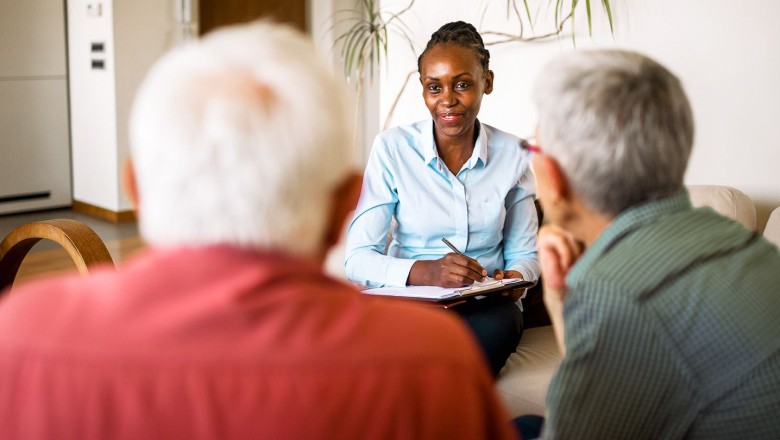
views
Features of a Good Psychoeducation Program for Bipolar 1 Disorder
Living Well With Bipolar DisorderBipolar Disorder5 Features of a Good Psychoeducation Program for Bipolar 1 Disorder Management
The more you know about your condition, the better you’ll be able to treat it.
Information and support provided by a good-quality psychoeducation program can play a crucial role in bipolar 1 disorder treatment.Getty Images
After being diagnosed, a person with bipolar 1 disorder and their healthcare team will settle on a treatment plan. One thing that plan should always include? A psychoeducation program.
Psychoeducation is an important, yet sometimes overlooked, part of a bipolar 1 care plan. It provides information that can help a person with bipolar 1 understand their disorder, recognize and manage their symptoms, and understand why they’ve been prescribed certain medications, as well as the risks and benefits of their medications, according to one review published in 2019. And, usually, this information helps people better stick to their treatment plan.
The review concluded that psychoeducation may be one of the most effective psychotherapies for bipolar 1 disorder. Group psychoeducation sessions around diagnosis (which is ideal) and over the course of several months resulted in the best outcomes.
Other research, published in the journal Psychological Medicine, found that people who had psychoeducation were less likely to have mood episodes, including manic, mixed, and depressive, compared with people who didn’t receive psychoeducation.
Here are a handful of key things a good psychoeducation plan should do:
It’s not enough to be diagnosed with bipolar 1 disorder, be given prescriptions for medication, and sent on your way. People with bipolar often experience stigma and shame, which can interfere with the ability to function, increase symptoms of depression and anxiety, and decrease the odds of taking medication, according to research published in September 2022.
A good psychoeducation program can help ease the shame of having bipolar 1 disorder by explaining the biological factors that may contribute to the condition, providing a more realistic view of the condition and its prognosis, and sharing information about the prevalence of the condition.
In other words, the message that should be conveyed is, you didn’t do anything wrong to cause your bipolar disorder, and you are not alone in your experience.
Some people stop taking their medication during a manic episode, possibly because they believe they no longer need it. This can be dangerous.
“If someone is ramping into hypomania, they need to trust that their healthcare provider still has their best interest in mind, and they need to believe that their medication is still important to adhere to in order to not enter into full-fledged mania,” says David Puder, MD, a psychiatrist in private practice and host of the podcast Psychiatry & Psychotherapy.
Therapy is also an important part of a good treatment plan, and you should feel comfortable reaching out to your therapist in times of distress. Psychoeducation should help you understand exactly why you’re on the treatment plan you’re on and address any concerns you may have so that you know that your providers are always on your side, working with — not against — you, he says.
Often, a loved one will be the first person to spot the signs of mania, such as increased irritability or high-risk behaviors. The signs may be subtle at first, but will eventually increase. “In a true manic episode, someone with bipolar 1 will ramp up over the course of weeks,” Dr. Puder says.
A psychoeducation plan will involve your loved ones, who will try to identify these signs as early as possible, says Puder. When that happens, you may need to tweak your medication or temporarily add another one to your regimen. Once your mood is stable again, you can go back to your original treatment plan. But it hinges on your loved ones flagging potential episodes of mania and helping you with treatment adjustments.
One of the dangerous things about bipolar 1 disorder is the ever-growing landscape of “natural” treatments. “There are people who prey on those with mental illness by selling them a solution that’s not evidence based or which evidence says doesn’t help at all,” Puder says.
Some education surrounding bipolar 1 disorder will focus on what works and what doesn’t. This way, you should be less tempted to take a supplement instead of your medication, especially if there’s no evidence that the supplement works.
Bipolar 1 management is not all about following a medication regimen (even though that’s important). Lifestyle practices are key, too. “Exercising, healthy eating, and good sleep are always recommended when someone is more stable,” Puder says. Exercise is particularly crucial. “There are things I teach my patients to do when they feel well or under mild distress. Exercise is one of them, especially if they have episodes of depression,” he says.
Puder explains to his patients that a severe episode of mania or depression in bipolar 1 disorder creates a “slight injury of the brain.” And that speaks to why creating an environment where your brain thrives is needed. “We encourage people to do what they can to make their brain as healthy as possible,” he says.




















Comments
0 comment